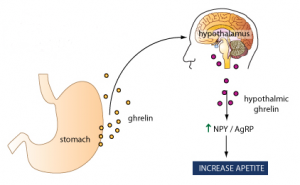By: Nicholas Gagnon
Edited by: Peter Milobar
Want to lose weight? Every blog, book, magazine, trainer, dietician will give you their own method on how to lose weight (i.e. eat less, exercise more, consume less high-calorie foods, avoid carbohydrates). But in the end, it all comes down to how many calories in you consume versus how many calories of work you put out, right? Not exactly. Weight gain is just as heavily based on genetic inheritance as it is on environmental effects and in order to understand this, we have to go down to the basics.

The editor’s way of dieting
There are two kinds of motives that drive our eating behaviour: hunger and satiety (feeling full). When your stomach feels deprived, it secretes Ghrelin, which tells your body its hungry. When your stomach feels full, it will secrete a number of things (CCK, Insulin and Leptin) to digest the food and tell your body to stop eating. However, there are numerous other chemicals and brain regions that influence these different signals causing your body to either keep eating or to put that donut down. Any slight problems in any of these pathways or brain regions can leave the individual with unnatural eating behaviours.

Science Rules!!
- Damage in your Peraventricular Nucleus: causes increased meal size
- Damage in your Ventromedial Nucleus: causes increased meal frequency
- Those with FTO gene have a 2/3 chance of becoming obese.
- Prader-Willis syndrome: produce higher than normal Ghrelin levels
What all these complicated terminologies mean is that obesity isn’t all that black and white. In addition, someone’s prenatal environment can highly influence your chance of becoming obese. Studies show that if a mother consumes a high-fat diet during pregnancy, the child will have a much higher chance of becoming obese due to Insulin and other chemical levels in the infant.
As you can see, environmental factors are not only culprit in the obesity epidemic. Genetics play a significant role in controlling someone’s metabolic rates and as a result, influencing their weight. Nonetheless, poor dieting and consumption of high calorie foods are still the largest problem in today’s society and need to be drastically changed if we want to see any change in our society’s health. There are no shortcuts for proper dieting and exercise to lose weight, but just remember that during a zombie apocalypse, you don’t have to be the fastest runner to get away. You just have to run faster than the guy next to you.

Stay fit…. cause ya never know

 Follow
Follow